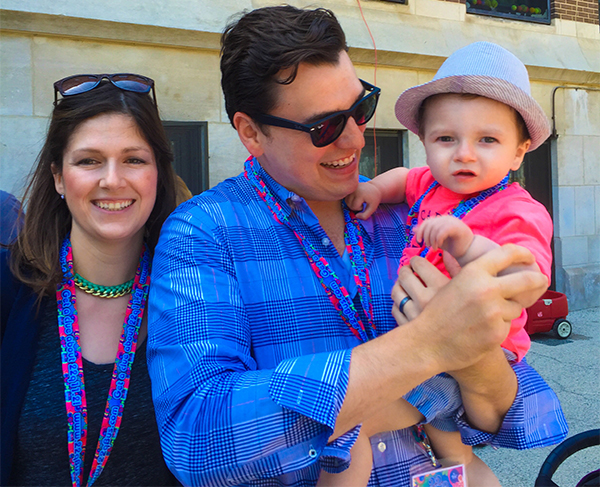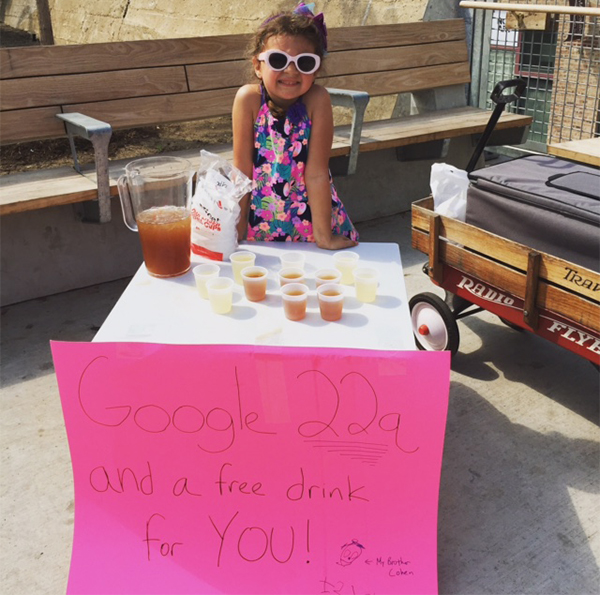“The ultrasound technician was being very quiet and taking longer than normal,” recalls Ryan Garcia. He and wife, Lindsey, were awaiting the results of her 20-week ultrasound for their second child. “At first, the doctor thought our son had Tetralogy of Fallot, a heart defect common with certain genetic disorders.” The Garcias decided to have an amniocentesis for genetic testing. After three rounds of testing, their son, to be named Cohen, was diagnosed with 22q11.2 deletion syndrome.

After Down syndrome, 22q is the second most common chromosome disorder. It is caused by a small missing portion, or deletion, of the 22nd chromosome. While it is estimated that 1 in 2,000 to 4,000 children each year are born with 22q, the actual number of people who are diagnosed with the syndrome is less than that because the symptoms range from mild to severe and are associated with almost 200 health and development issues.
Before the discovery of the deletion, the disorder was known by several different names. DiGeorge syndrome was associated with severe heart defects, hypoparathyroidism and severe immune deficiency. A combination of milder heart defects, feeding issues, speech problems and cleft lip/palate was identified as VCFS (velocardio facial syndrome). Now, all symptoms are realized to fall under the 22q11.2 umbrella. The number of names associated with the symptoms only compounds the issue of diagnosing and managing healthcare for 22q.
“There are individuals with 22q who need 24-hour care, while there’s also a woman with 22q who has the same master’s degree I do,” says Bettsy Leech, genetic counselor and 22q/VCFS coordinator at Cincinnati Children’s Hospital and Medical Center. “If your child has birth defects, developmental delays and learning problems that are not going away, you should consider a genetic evaluation.”
An early diagnosis can save years of confusion and frustration. It provides parents and practitioners with a roadmap and warning signs, enabling symptoms to be caught while they are small. About 75 percent of 22q patients have a cardiac anomaly. Anxiety is the single most common symptom, with 98 percent reporting. Learning disabilities are common.
“Their whole lives are built on anxiety,” explains Leech. “It’s like listening to a foreign language tape for a region in India, then just getting dropped off there. You don’t know the culture. You’re bound to offend people. The anxiety builds and these children have less bandwidth to focus on learning.”
Scoliosis is another possible concern as children reach puberty, but Leech says less than 5 percent of the kids with 22q who she is familiar with have scoliosis. A bigger, and more frightening concern, she says, is the 25 percent risk for schizophrenia.
When the Garcias received their son’s diagnosis in August 2013, they immediately turned to the Internet for information. The Dempster Family Foundation, founded by former Cubs’ pitcher Ryan Dempster when his daughter, Riley, was diagnosed, was a wonderful resource. Focused on building awareness and supporting 22q families, the Dempster Family Foundation (DFF) pitches in to provide a leg up in managing children’s special education needs and developing a roadmap to success. The Dempster Family Foundation is planning to close, but The International 22q11.2 Foundation, Inc. provides similar resources for families.
No stranger to helping others, Ryan Garcia quickly realized he had a platform to build awareness for this seldom discussed syndrome. You may remember Garcia as the Chicago dad who pledged to perform 366 Acts of Kindness in 2012 after his daughter, Isla, was born.
“I wanted to make the world a better place for her and set a good example,” recalls Garcia. “For the final act of kindness, we were going to adopt a baby.” Those plans were delayed when the Garcias discovered they were pregnant. When Cohen was diagnosed with 22q, instead of worrying about every possible negative outcome, Garcia decided to evolve his efforts into State of Kind — he pledged to perform an act of kindness in every state, to raise awareness for 22q.
The first State of Kind endeavor was completed in October 2013, a month before Cohen was born. Garcia raised over $1,200 in gasoline gift cards to offset the travel expenses of an Indiana single mother of three special needs children, including one in a facility two hours from her home. To date, six acts of kindness have been completed, in Indiana, Illinois, Florida, Georgia, Vermont and Texas. State of Kind gifted lawn care and spa services to a mother of two young boys who was recovering from colorectal cancer after she lost her husband, father and father-in-law to other forms of cancer. Kyle Korver of the Atlanta Hawks donated great seats to a game and Ricky Stenhouse, Jr., provided an autographed model of his NASCAR racecar to State of Kind recipients.
“It’s really bonded us as a family,” says Garcia. “Our mission is now to raise awareness.” Daughter Isla has been known to host drink stands and request donations to 22q in lieu of birthday presents.

22q is a common syndrome that is rarely diagnosed. Education allows those affected to be proactive. You can help put 22q on the public radar by sharing this article.

